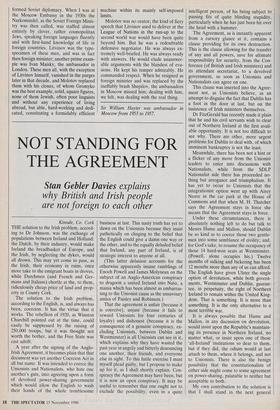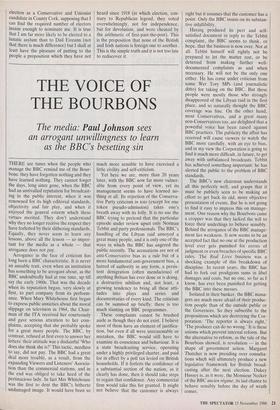NOT STANDING FOR THE AGREEMENT
Stan Gebler Davies explains
why British and Irish people are not foreign to each other
Kinsale, Co. Cork THE solution to the Irish problem, accord- ing to Dr Johnson, was the exchange of populations between Ireland and Holland: the Dutch, by their industry, would make Ireland the breadbasket of Europe, and the Irish, by neglecting the dykes, would all drown. This may yet come to pass,• as the Irish, their economy in ruins, once more take to the emigrant boats in droves, while Dutchmen (and French and Ger- mans and Italians) chortle at the, to them, ridiculously cheap price of land and prop- erty in County Cork.
The solution to the Irish problem, according to the English, is, and always has been, coercion. It has the virtue that it works. The rebellion of 1920, as Winston Churchill pointed out at the time, could easily be suppressed by the raising of 250,000 troops, but it was thought not worth the bother, and the Free State was cast adrift.
A year after the signing of the Anglo- Irish Agreement, it becomes plain that that document was yet another Coercion Act in all but name. It was intended to coerce the Unionists and Nationalists, who hate one another's guts, into agreeing upon a form of devolved power-sharing government which would allow the English to wash their hands of the whole troublesome business at last. This nasty truth has yet to dawn on the Unionists because they insist pathetically on clinging to the belief that the English could give a damn one way or the other, and to the equally deluded belief that Ireland, any part of Ireland, is of strategic interest to anyone at all.
(This latter delusion accounts for the otherwise apparently insane ramblings of Enoch Powell and James Molyneux on the subject of an Anglo-American conspiracy to dragoon a united Ireland into Nato, a mania which has been almost as embarras- sing to the Unionist cause as the unsavoury antics of Paisley and Robinson.) That the agreement is unfair (because it is coercive), unjust (because it fails to reward Unionists for four centuries of loyalty) and dishonest (because it is the consequence of a genuine conspiracy, ex- cluding Unionists, between Dublin and Westminster) is all Unionists can see in it, which explains why they have wasted the past year in angrily and bitterly denouncing one another, their friends, and everyone else in sight. To this futile exercise I must myself plead guilty, but I propose to make up for it, as I shall shortly explain. Con- spiracy the Agreement may have been, but it is now an open conspiracy. It may be useful to remember that one ought not to exclude the possibility, even in a quite intelligent person, of his being subject to passing fits of quite blinding stupidity, particularly when he has just been hit over the head with a hammer.
The Agreement, as is instantly apparent from a cursory glance at it, contains a clause providing for its own destruction. This is the clause allowing for the transfer of any and all powers, save for ultimate responsibility for security, from the Con- ference (of British and Irish ministers) and its attendant secretariat, to a devolved government, so soon as Unionists and Nationalists can agree on one.
This clause was inserted into the Agree- ment not, as Unionists believe, as an attempt to disguise the fact that Dublin has a foot in the door at last, but on the insistence of Irish ministers themselves.
Dr FitzGerald has recently made it plain that he and his civil servants wish to clear out of Northern Ireland at the first avail- able opportunity. It is not too difficult to see why. There are other, more urgent problems for Dublin to deal with, of which imminent bankruptcy is not the least.
Meanwhile, there has been not a hint or a flicker of any move from the Unionist leaders to enter into discussions with Nationalists, while from the SDLP Nationalist side there has proceeded no- thing but arrogance and triumphalism. It has yet to occur to Unionists that the integrationist option went up with Airey Neave in the car park at the House of Commons and that when M. H. Thatcher says the Agreement stays in force she means that the Agreement stays in force.
Under these circumstances, there is absolutely nothing left to do but talk to Messrs Hume and Mallon, should Dublin be so kind as to coerce those two gentle- men into some semblance of civility; and, for God's sake, to resume the occupancy of those 14 hard-won seats at Westminster. (Powell, alone occupies his.) Twelve months of sulking and bickering has been 12 months more than any of us can afford. The English have given Ulster the single option of devolution, while both govern- ments, Westminster and Dublin, guaran- tee, in perpetuity, the right of Northern Ireland to remain within the United King- dom. That is something. It is more than something. It is the only alternative to a most terrible war.
It is always possible that Hume and Mallon, in any discussion on devolution, would insist upon the Republic's maintain- ing its presence in Northern Ireland, no matter what, or insist upon one of those `all-Ireland' institutions so dear to them, but if they did, the odium would at last attach to them, where it belongs, and not to Unionists. There is also the benign possibility that the constitutionalists of either side might come to some agreement on power-sharing, palatable to neither but acceptable to both.
My own contribution to the solution is that I shall stand in the next general election as a Conservative and Unionist candidate in County Cork, supposing that I can find the required number of electors insane enough to nominate me. It is true that I am far more likely to be elected to a lunatic asylum than to Dail Eireann (not that there is much difference) but I shall at least have the pleasure of putting to the people a proposition which they have not heard since 1918 (in which election, con- trary to Republican legend, they voted overwhelmingly, not for independence, but for devolution, and were cheated by the arithmetic of first-past-the-post). This is the proposition that none of the British and Irish nations is foreign one to another. This is the simple truth and it is not too late to rediscover it.



































































 Previous page
Previous page